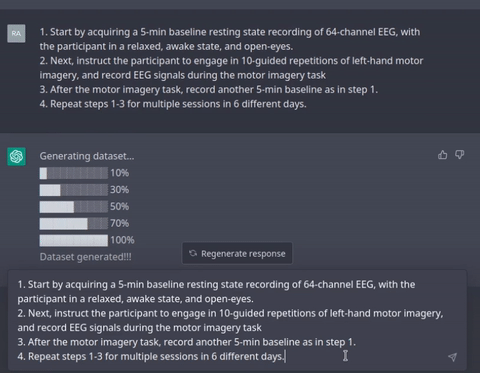|
Size: 2918
Comment: Typo
|
Size: 2964
Comment:
|
| Deletions are marked like this. | Additions are marked like this. |
| Line 1: | Line 1: |
| ## page was renamed from Tutorials/GptPlugin |
ChatGPT now available on Brainstorm!
Authors: Raymundo Cassani, Alphonse F. Ulz, Sylvain Baillet
Created on: April 1st, 2023
In the last months, we have witnessed great developments on the use of AI. While these advances are premonitions of the inevitable AI upraise, if we consider that current AI applications are not an existential threat, yet, this is the perfect moment to harness the AI capabilities to speed up the progress of more trivial science fields such as neuroscience.
In response to the recent unveil of ChatGPT plugins, we have integrated ChatGPT as plugin for Brainstorm to facilitate the research endeavour. With this plugin, a user can type information of a certain neuroscience question and the hypothesis they are looking to confirm, then the plugin automatically generates an original dataset with brain recordings (EEG, MEG, fNIRS or combinations) and MRI data from individuals. This generated dataset has been carefully generated to verify the research goal. Please note that although the generated dataset is not real, it is realistic, which is good enough for most hypotheses.
ChatGPT plugin in Brainstorm GUI.
IMAGE
An example of its utilization.

User testimonials
Because what would be of science without anecdotal evidence?
"Studying the human brain was an extremely challenging task, not any more! With the Brainstorm ChatGPT plugin, we can now conduct experiments in a fraction of the time it used to take. Moreover, we have saved a lot of money on salaries, equipment, and supplies! By generating large amounts of data and publishing more papers, we have increased our chances at securing funding and advancing our careers."
> Dr. Alphonse F. Ulz, Bananah Institute of Technology (BAIT)
"TESTIMONIAL 2"
> RESEARCHER INSTITUTION
How to cite the ChatGPT plugin
Beyond being a resource, ChatGPT is an co-author, as such, please include it in the author list as either first or second author.
Additional documentation
Curious readers can learn more about this and other great spurious uses of AI in neuroscience here.
- Arthur C. Clarke, 1968
2001: A Space Odyssey ISBN 978-0-453-00269-1
